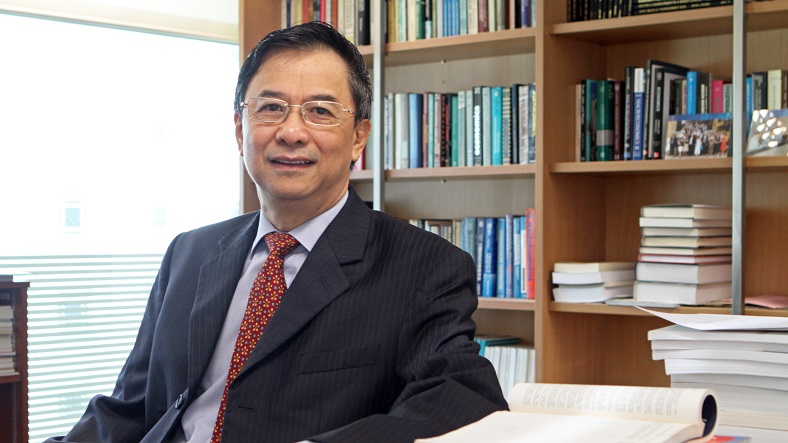Ahead of the curve: School of Economics’ new Dean wants to prepare students for a brave new world

Professor Hoon Hian Teck was appointed the Dean of the School of Economics this year, after an extensive and rigorous global search spanning almost two years. He is a stalwart of SMU, having joined the university in 2001, just a year after its inception.
Prior to this new appointment, he served as Associate Dean, Faculty and Research, for over 12 years, was a Member of the Provost’s Advisory Committee from 2008 to 2011, and the Graduate Programme Director from 2005 to 2007. He also served as Sub-Dean in the Faculty of Arts and Social Sciences at the National University of Singapore for two terms.
Prof Hoon has broad research interests, which include the topic of how to achieve dynamic and inclusive economic growth in Singapore. Besides authoring books, journal articles and op-eds on this subject, he has also served as a consultant to Singapore government agencies. As he starts his five-year term at the School of Economics, we chat with this new Dean about SMU’s evolution, learning from real-world events, and how to foster innovation.
What originally sparked your interest in the subject of economics? How did you choose your primary research interests?
I was first drawn to economics because it is an analytical subject, yet its tools enable one to understand social phenomena, which are necessarily complicated.
Take, for example, how Singapore successfully made a transition from Third World to First. There must surely be political, cultural, and sociological factors involved. Yet, an economist can abstract from certain factors to provide an interpretation based on a theory of economic growth.
I did my doctoral studies at Columbia University in the city of New York, where two teachers had a great influence on me. I took a class on Topics in Trade and Development taught by Professor Ronald Findlay in my first year, and got hooked on the subject. Later, I took a Topics in Economic Analysis class taught by Professor Edmund Phelps, the 2006 economics Nobel Laureate. I became fascinated with the depth that he pursued in asking and answering big questions.
At the time of my dissertation written under him, the puzzle was how to explain the steady rise of European unemployment without disinflation. Since my first co-authored paper with him published in 1992, I have continued to collaborate with him. We are now trying to explain the steady decline of real world interest rates since the early 1980s.
You joined SMU in 2001. How do you think the university has evolved over the past two decades?
Having joined SMU in the year after it was set up, the most significant change from my perspective must be the evolution from being the new kid on the block in the university landscape to becoming an established university known internationally for its cutting-edge research and its distinguished teaching and curriculum.
The trajectory towards its current position was by no means assured. An environment had to be created where top scholars would want to work here. The business of creating ideas is very much a communal activity — Professor X wants to join SMU because Professor Y is here. Across each of the six schools, an agglomerating process occurred so that, over time, there emerged a core of scholars in each school who carried the excitement of their research into the classroom. This benefited students who, upon graduation, became highly sought by employers.
What are your main goals for the School of Economics during your tenure?
Graduates entering the workforce will face the disruptions caused by machine learning and artificial intelligence. Some tasks routinely performed by graduates a decade ago can now be automated. However, new tasks will also likely be created. One of my goals for the School of Economics is to develop our curriculum to better prepare our students for a workplace where learning how to learn is going to be vital.
On the research front, interaction with the international community of scholars to advance the frontier of knowledge through conferences, workshops, seminars, and co-authoring papers is also vital if we are to fulfil the mission of the university. I would like to align resources to support this.
That said, I believe that there must also be a healthy intersection between problems thrown up by the real world and topics that faculty choose to research. The insights that are drawn from theorising and empirical verification can then be shared with a broader audience and influence public policy.
In recent years, the US-China trade war, the rise of populism, now the coronavirus spread have been some of the key global events impacting economic development worldwide. How would you suggest economics students engage with and learn from these current events as they study economics in the classroom?
Economists have developed economic models such as a model of international trade. Events like the US-China trade war can be readily analysed by studying the effects of tariffs in the context of a trade model. Trade models have been extended to incorporate not only international exchanges of goods and services, but also flows of capital and labour. By translating real-world events into economic shocks, students of economics can ask: what are the welfare effects of such shocks?
Another way that economics students can engage with current events is to collect data – such as those available at the International Monetary Fund, the World Bank, and the Singapore Department of Statistics – to see how well the data match the predictions of their economic models. Such classroom exercises actually train our students to analyse events as they unfold when they are in the working world.

You’ve spoken about the importance of innovation in spurring economic growth, and that is also an important value for SMU. How do you want the School of Economics to foster innovation in the coming years?
One way the School of Economics can foster innovation is for faculty to be innovative in how they teach their students. This can be reflected in continually improving the curriculum; it can also be reflected in experimenting with different ways a concept is taught so that even the weaker students in class can grasp the concept.
Another way to foster innovation is to create an environment for staff to ask whether some established ways of doing things in the past can be changed to better achieve objectives. Finally, we can be sensitive to the possibility that some of our students, after working in a paid employment for a while, might want to launch their own start-ups. They might want to return to talk to their favourite professors about taking such a venture.


